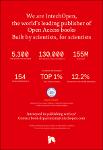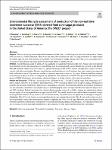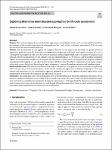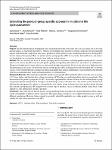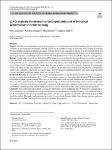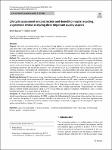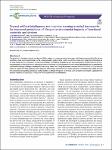Browsing by Subject LCA
Showing results [1 - 8] / 8
In this chapter, the life cycle assessment was presented as a tool to implement sustainable development in the bioeconomy and circular economy. Bulky waste includes large items such as furniture, doors, flooring and mattresses. The management of bulky waste is a serious problem for European countries. The URBANREC project proposed a solution to this problem through the use of new technologies for the bulky waste processing. The aim of the URBANREC project is to implement an eco-innovative, integrated system of bulky waste management and demonstrate its effectiveness in various regions of Europe. The project has received funding from the European Union. In this chapter, the LCA environ... |
There is increasing concern about the detrimental health effects of added sugar in food and drink products. Sweeteners are seen as a viable alternative. Much work has been done on health and safety of using sweeteners as a replacement for added sugar, but very little on their sustainability. This work aims to bridge that gap with a life cycle assessment (LCA) of sucralose derived from cane sugar grown in the United States of America (USA).
Methods |
This work investigates the use of alternative approaches to normalization in life cycle assessment (LCA) and shows the relevance of the normalization step in the interpretation of the results of life cycle impact assessment (LCIA) by testing the use of five alternative normalization sets. |
Recent methodological developments have integrated nutritional aspects into life cycle assessment (LCA) by using nutrient indices as functional units (nFUs). Previous developments have focused on protein-rich foods, but environmental impacts and nutritional composition vary across products in other product groups, highlighting the need to develop nFUs also for other product groups. Here, we present product-group-specific nFUs for vegetables, fruit and berries, and sources of carbohydrates as an extension to our previous study on protein sources. |
Mortality and suboptimal biological performance are a widespread problem in finfish farming. The associated losses constitute an environmental opportunity cost that needs to be thoroughly assessed to prioritize actions aiming at reducing the environmental impacts of finfish aquaculture. We here propose and demonstrate the use of a new parameterized and consequential LCA model of sea-trout production designed to assess the environmental opportunity costs of suboptimal biological performances, considering distinct mortalities and biological feed conversion ratios (FCRs) along the rearing process. |
Life cycle assessment (LCA) is increasingly being applied to construction and demolition waste (CDW) recycling. But what is the current state of LCA studies on CDW recycling? In the context of circular economy, several aspects become important in LCA, such as avoided impacts and consideration of the quality of recycled materials. The aim of this study is to identify inconsistencies and best practices, and then provide recommendations for future LCA studies focusing on CDW recycling. |
The application of functional materials and devices (FM&Ds) underpins numerous products and services, facilitating improved quality of life, but also constitutes a huge environmental burden on the natural ecosystem, prompting the need to quantify their value-chain impact using the bottom-up life cycle assessment (LCA) framework. As the volume of FM&Ds manufactured increases, the LCA calculation speed is constrained due to the time-consuming nature of data collection and processing. Moreover, the bottom-up LCA framework is limited in scope, being typically static or retrospective, and laced with data gap challenges, resulting in the use of proxy values, thus limiting the relevance, acc... |
The use of plastics in products and packaging is growing. At the same time, the lifespan of packaging is short and consequently plastic waste volumes are growing in Finland and globally. Although separate collection and recycling of plastic packaging waste exists in Finland, it needs to be strengthened to reach the European Union’s targets. The separately collected plastic waste is mechanically recycled, but the recycling capacity is small, as is the process’s yield of secondary polymers. Hence, a large share of plastic packaging waste remains being recovered for energy. In our study, we first apply material flow analysis (MFA) to identify different routes of plastic packaging waste i... |

